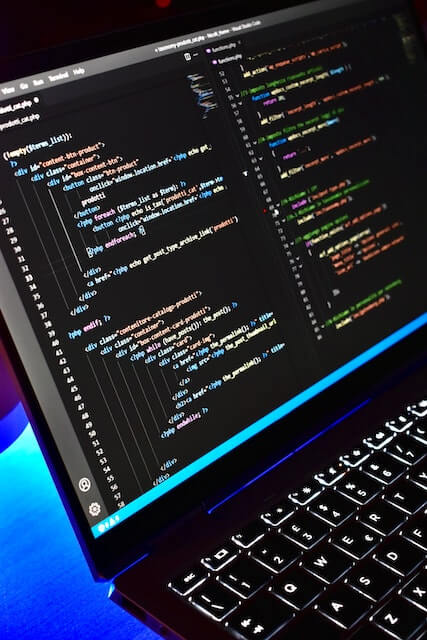
2024 Software Development Trends: Innovations and Future Promises

The software development market grows at an impressive pace, as more and more new technologies emerge on a daily basis. Overall, this market is expected to reach around USD 1,789.14 billion by 2032. To stay on top of the software development market, you need to understand all the primary market trends. Embrace them and invent something new on top of these technologies in order to create innovative software solutions. Here is the ultimate guide for 2024 that will help you understand the main market trends, their promises, and the value of all such innovations.
Software development market: Key trends in 2024
The list of software development trends can be truly vast. However, here we have collected the ones that are especially popular among IT customers. All these trends are frequently discussed at various leading industry conferences. Here is an overview of promises, challenges, and implementation opportunities for the most interesting software development market trends. Each of these innovations brings particular businesses solid benefits and innovation opportunities.
AI is the staple of modern software development
Let’s start with the main buzzword in the current domain of software solutions. Artificial intelligence is on the rise, and we are still far from reaching its full potential. The current promises of AI software development reshape various industries.
- AI in process automation
As for now, the main advantages of this trend are process automation, user experience personalization, and continuous innovation. Various AI-driven tools, like chatbots, analytical scripts, and smart search engines help companies handle repetitive tasks. This allows businesses to free up human workers to focus on more strategic endeavors. As for now, AI software is completely revolutionizing customer services and various analytical domains. Many companies employ LLMs (large language models) to create AI employees capable of handling various repetitive assignments. The key point is that these models can be trained. This means improving their efficiency and capacities over time.
- AI in healthcare
Another domain that is strongly affected by AI is healthcare. Such software is revolutionizing diagnostics and treatment plans through predictive analytics and machine learning algorithms. Such tools can analyze vast amounts of medical data to identify patterns and suggest personalized treatment options.
- AI in finance
The promise of AI extends to finance, where it supports fraud detection, trading algorithms, and personalized banking experiences. Even creative domains, such as art, music, and writing enable the generation of original content.
- AI in logistics
AI software development is also pivotal in advancing logistics. For example, self-driving cars and drones promise safer and more efficient transportation and logistics.
- AI in e-learning
In education, AI-powered platforms offer personalized learning experiences. They can adapt to individual students’ needs and pacing, thereby enhancing learning outcomes.
Discover how we helped Helliwood Media & Education boost media literacy by creating a slick multimedia e-reader app for school books.
Internet of Things (IoT)
This is another buzzword in the modern IT market. Many scientists and business executives see systems of perfectly interconnected smart devices as the future of software development.
- IoT and smart homes
IoT promises to revolutionize smart homes, enabling seamless integration and control of appliances, lighting, heating, and security systems. All these advantages can be achieved through intuitive interfaces and voice commands. This, in turn, enhances convenience, energy efficiency, and security.
- IoT and the industrial sector
IoT also affects the industrial sector. In particular, such technologies are broadly used for the development of smart factories with interconnected machinery and devices communicating in real time. Such innovations help manufacturing plants optimize production processes, reduce downtime through predictive maintenance, and improve overall operational efficiency.
- IoT and healthcare
In healthcare, IoT devices and software are enabling remote monitoring of patients’ vital signs. This ensures more proactive and personalized care. IoT devices are also essential for remote patient care and health tracking.
- IoT and agriculture
In highly digitized countries, IoT also enhances the agricultural sector. Such tools support smart farming techniques, as sensors and connected devices are used to monitor soil health.
- IoT and smart cities
Smart cities represent another significant promise of IoT. Interconnected infrastructures lead to improved urban management, reduced traffic congestion, and enhanced public safety.
Alongside these promises, there are significant challenges and concerns that need addressing. In particular, businesses that embrace IoT software development should pay much attention to data security and privacy. Another challenge is managing the massive amounts of data generated by IoT devices. It is also important to ensure interoperability among diverse IoT systems. If you focus on dealing with such issues, you can get an immediate advantage over the competitors embracing IoT technologies. Collaboration among technology developers, policymakers, and stakeholders is essential to navigating these challenges. In this case, the potential of this technology can be fully implemented. The main aim of this course is to create a more connected, efficient, and intelligent world. And, surely, such software development innovations can boost the efficiency of many businesses dramatically.
Virtual Reality (VR)
Virtual Reality (VR) technologies are also bringing a number of significant promises. First of all, such innovations revolutionize the way users experience digital content. It goes about providing immersive and interactive experiences that transcend traditional media.
- VR and entertainment
VR plays a pivotal role in numerous industries, including the realm of entertainment. This technology brings new levels of immersion when it comes to virtual concerts, theater performances, and other live events.
- VR and e-learning
VR also changes the educational domain with its great opportunities. It can be used for simulating real-world scenarios. In addition, it can be used by teachers for recreating historical events or researching human bodies. As a result, learning becomes much more engaging and interesting to students.
Discover how our team helped Veritone create the world’s first AI operating system.
- VR and healthcare
VR software also creates great opportunities in the medical field. For example, surgeons can use virtual scenarios to rehearse complex procedures. This reduces the risk of errors during actual surgeries. Virtual reality software is also making strides in mental health treatment. VR apps support immersive therapies for conditions such as PTSD, anxiety, and phobias.
- VR and real estate
Real estate is another industry ripe for VR transformation. Potential buyers can take virtual tours of properties, experiencing the layout and ambiance.
- VR and manufacturing
VR also helps engineers prototype divides and items before manufacturing them. Such tools help engineers to visualize and test products in a virtual space before committing to physical production. This feature reduces the risks of manufacturing unfitting objects dramatically.
Just like in case with any other market trend, there are some challenges you should consider while opting for VR software development. It is important to address potential health concerns related to prolonged VR use and develop content that fits the medium’s capabilities. There is also the need to create standards and best practices for VR development. This will help you ensure an excellent user experience. The future of VR promises a transformative impact on how we live, learn, work, and play. For sure, it is not a trend to be ignored in the software development domain.
Progressive Web Apps (PWA)
Progressive Web Apps (PWAs) bring much innovation to the domains of web and mobile application development. They offer a blend of the best features of traditional web and native apps. PWAs promise to deliver fast, reliable, and engaging user experiences directly through web browsers without requiring downloads from app stores. In addition, PWAs can work offline or in low network conditions. The point is in service workers that cache essential resources and enable background synchronization. PWAs also promise seamless and instant updates. Once the developers release any update, it immediately becomes available to a user through a web browser. This feature brings great agility to the development process. PWAs are also highly responsive and adaptive, designed to work on any device with a single codebase. This makes them a popular alternative to apps built with cross-platform frameworks, like Flutter and .NET MAUI.
From a business perspective, PWAs offer cost-efficiency and a broader reach. Instead of building several apps with native approaches, the team can build a single PWA. A PWA will be available across various devices through browsers. This approach also allows businesses to reach a wider audience, including users who might be hesitant to download native apps due to limited storage space or concerns about data usage. Moreover, PWAs can be indexed by search engines, improving discoverability and driving organic traffic much better than native apps.
However, despite these promises, the adoption of PWAs does face challenges. For example, such apps offer limited support for certain native device features on some browsers and platforms. In addition, in some cases, PWAs are not the best options in terms of performance and app flexibility. Nonetheless, ongoing advancements in web technologies and increasing browser support are steadily closing these gaps. As an emerging alternative to cross-platform solutions, PWAs certainly hold many promises. Such apps might be less user-centric and performing than solutions built with Flutter. However, the affordable costs and great accessibility of progressive web apps are important factors making them a hot trend in software development.
No-code and low-code development frameworks
No-code and low-code development technologies are also often mentioned when it comes to trends in software development. Those are the platforms allowing specialists to build apps with simple drag-and-drop capabilities. This significantly reduces the time and cost associated with traditional development methods. Both approaches also decrease the entry level of software development dramatically. No-code development platforms allow employees without any coding expertise to create web applications. In low-code development, some coding is required, but its amount is minimized. As a result, both no-code and low-code development technologies make software development accessible to non-technical specialists.
Meanwhile, such technologies still have significant limitations. In particular, no-code and low-code frameworks have predefined templates and components. These templates can limit the ability to fully customize the application according to specific needs. Complex or highly unique functionality might not be achievable within the constraints of the platform. In addition, such apps are limited in terms of performance and have very basic architectural patterns that may not fit specific needs. Therefore, no-code and low-code development solutions are not a universal panacea to all software development challenges. However, such platforms are still very popular among businesses that want to build basic and simple web platforms in the short term and with significant budget limitations.
Wrapping up
There are many software development trends and technologies that are worth mentioning. This article provides some insights into the hottest trends in software development in 2024. Artificial intelligence, IoT, virtual reality, progressive web apps, and no-code/low-code development technologies are on the rise. And these solutions offer you many opportunities that deserve your attention. If you want to stay on top of the innovation, rely on industry experts.
Contact us at nCube to find out how our professional teams of software development specialists will help you leverage next-generation technologies. With a solid portfolio of unique and innovative projects, we will help you master the hottest IT innovations.
Recommended articles


